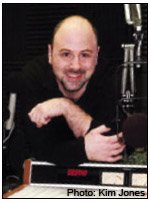 Saving American Music means a lot to the staff of Elmore, and it certainly means a lot to me. I have always been interested in preservation and in keeping tradition alive. My family calls me “family historian,” and in a more public setting I like to believe I am doing my part with my greatest passion—music.
Saving American Music means a lot to the staff of Elmore, and it certainly means a lot to me. I have always been interested in preservation and in keeping tradition alive. My family calls me “family historian,” and in a more public setting I like to believe I am doing my part with my greatest passion—music.
When I was eight years old I became fascinated with the medium of radio, and by the time I was 13 I knew I wanted to be a radio personality. I was always listening to the stations that featured music performed before my time, and the information the jocks and their guests shared thrilled me to no end. In the dozen years that I have been on the air, I have talked to many of the greats who helped create American music. Whether it be jazz (Lionel Hampton, Dave Brubeck), American popular standards (Peggy Lee, Rosemary Clooney) or oldies/R&B (Ruth Brown, Ben E. King), it has been an honor to talk to these remarkable artists and preserve their stories.
In recent years I have found myself in the fortunate position of hosting a program featuring the music that many consider the most American of all—country. What makes this significant for me is that I virtually stand alone in the big city of New York and its surrounding counties in playing country music on the radio. In a way it’s a sad honor for a genre of music that used to be on more than a few stations in and around the Big Apple. I feel it’s an honor that comes with a responsibility. I take Saving American Music to heart each and every time I am on the air preserving country music on New York’s airwaves.
It doesn’t matter whether it’s honky-tonk, countrypolitan, bluegrass, Western swing, rockabilly, Bakersfield or outlaw. It’s all good, and it’s all celebrated on The Country Show. It’s also celebrated in Elmore with articles that connect the past to the present. In the January/February 2008 issue I had the pleasure of talking with the offspring of Johnny Cash and June Carter Cash to see how they moved on in the five years since their famous parents’ passing. In the issue you hold now, Scott Peavler looks back on 35 years of outlaw country, and in the process of tracing its origins he profiled Buck Owens. Prior to his Hee-Haw days, Owens was every bit the rebel. He was also someone I got to know only during the last days of his life. After two years of gentle prodding, finally Buck agreed to an interview on March 17, 2006, eight days before his sudden death. He promised me only 15 minutes, and to my very pleasant surprise I could not shut him up! I ran out of tape twice and we talked for nearly two hours.
I have had the joy of interviewing some of the biggest names in country music history. George Jones, Kitty Wells, Merle Hag gard, Porter Wagoner, Earl Scruggs, Eddy Arnold and many others have all dropped by The Country Show, but that bittersweet experience of conducting Buck Owens’ final interview will stay with me forever. “This is one of the best interviews I’ve done in many a year and you conducted it,” Owens told me as we were saying goodbye. “So, you should congratulate yourself.” Could there be a greater honor bestowed on this country music historian? I proudly say, NO.
—Michael Anthony
The Country Show is heard on WHPC 90.3 FM, will be streaming online before the end of 2009.



Be the first to comment!